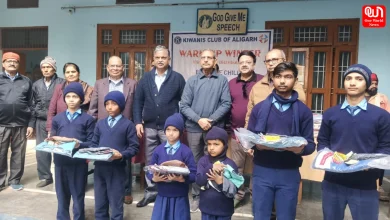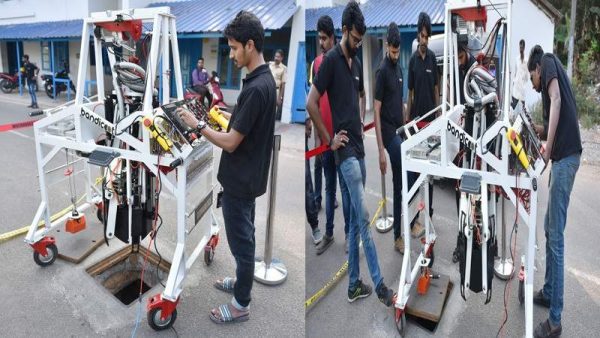Pottery Getting Remoulded


India is rich in arts since ancient times but as the time is changing the definition of art is changing too, and old forms of art are somewhere disappearing or losing their importance. Wondering the same, A. Kameshwari from One World News caught up with Rekha Bajpe, a Delhi based Pottery Artist, in an exclusive conversation.
Tell us something about ‘Naked Raku’ workshop?
Rekha: ‘RAKU’ is a special Japanese technique of firing clay which has an appealing immediacy, as compared to the normal longer firings. Within the larger Raku technique which involves glazes, there is another method which leaves the clay body beautifully exposed after peeling off the layer of glaze and slip. That is why the technique is called ‘Naked’ Raku. The workshop teaches potters this special technique.
Who do you design for?
Rekha: I primarily design for my own sense of satisfaction. I feel if I find a resonance with what I am creating, then the person I am creating it for, will be able to feel the positive vibrations too. If it is a utility item, then I create it keeping in mind the end users, and their aesthetic sensibilities.
Ultimately, as an artist, I give more importance to form per se, than to form following function.
The culture of Pottery is losing its entity somewhere, what do you think is the reason?
Rekha: Traditional pottery is losing its identity due to the advent of cheaper and more durable alternatives like plastic and cheap metal. Due to a fast dropping demand curve, the loss of economies of scale, and the rapidly diminishing markets, a large number of traditional potters are switching to other professions due to these huge financial setbacks.
Studio pottery, on the other hand, is only just coming into its own. With access to the World Wide Web, the world has shrunk, thus an easy accessibility to world news, which as a silver lining has also brought the urban studio potters up-to-date with global methods and techniques.
Are you still working as an advertising film maker?
Rekha: No, I have taken a break from advertising film-making, but I still use the camera as a favourite tool to film and document the disappearing traditional pottery techniques.

Tell us something about your exhibitions, ‘Essence of a woman’ and ‘Inner vision.’
Rekha: An exhibition takes place when an artist has something new to display. My theme of the year is Buttons, something I am exploring in myriad ways through a series of multi-media displays in different exhibitions.
The ‘Essence of a Woman’ was a show by women artists to focus on the angst and heartbreaks of women on the occasion of International Women’s Day. My mixed-media installation titled ‘Buttons’, brought attention to women as being ‘useful objects’ that are mostly ignored and relegated to the background, unless they go missing from their ‘place’ specially in households, somewhat like buttons.
‘Inner Vision’ is a group show where I am displaying a multimedia installation which includes ceramic, metal and photographs. Again using buttons as the theme, the displayed artwork focuses on ‘Negatives Redefining Positives’, a look into the inner workings of psychological profiling of optimism, where even negatives have a positive role.

Do you think this form of Art can be taken up as a main-stream career option?
Rekha: Certainly, it can! The sophistication of a civilisation has always been gauged by the art created in that period. This will continue to be the touchstone. This form of minimalistic and mixed media is always welcomed as a mainstream career option, and in fact it is not optional, but rather a compulsion.
You are a writer, a poet and also an artist, are there more pages to your book?
Rekha: For a creative person, the book is endless!!! There is no limit to creativity or creative media. I think of the meaning of my name, ‘Rekha’, as limitless. (Definition of a Line: A collection of dots with no end point………………!!!)
How are you planning to restore this form of art?
Rekha: Traditional pottery is the very basis of civilisation. I am trying to provide a holistic solution to the problem of potters changing their profession by simultaneously providing skill enhancement and up-gradation; modernisation of design; and the creation of an on-going market to have a continuing source of income, for the traditional potters.
Simultaneously, I am trying to document and preserve at least pictures and films of the dying crafts. I have been working with traditional potters over the last two years towards attaining this goal. I have a very long journey and a very arduous task ahead, but I have the belief and the courage of my convictions.
What are different forms of pottery?
Rekha: Pottery can be classified in several ways. It can be classified in terms of the type of clay used, the type of technique used in creating it, the kind of firing technique used, the end use in terms of utility, beauty and/or both, and many others.
Pottery is a very vast and wide field, touching upon every field of study from Geology, Theology, Mathematics, Physics, Chemistry, Eutectics, etc., even History, Ethics and Rocket Science! If you think I am just kidding, please look up ‘Ceramic in rocket science’ on Wikipedia!

Tell us about running and upcoming trends of Pottery?
Rekha: The best trend in Pottery off late is that there is a wide range of pottery being created today without any limitations to their techniques. Experimentation is the order of the day as studio pottery in India is still in its nascent stage compared to the western and eastern world. Here, we are still in love with the medium, and are still spending time exploring it rather than using it as simply a medium of expression.
It is an exciting time to be in this cusp between the first two centuries of studio pottery in India.
What difference do you find between India and other countries in terms of art?
Rekha: Art is an expression of the heart, whichever country it originates in. I do not find that much of a difference between the ancient art forms in India versus that found in other countries, nor do I find much difference between the contemporary arts in both places. The exception, perhaps, is that art in India has never really bordered on the macabre as it has in Western countries off late.
Who is Rekha Bajpe as an artist?
Rekha: She is a creator, going with the flow, creating with whatever crosses her path, be it words, music, images, clay, paint, metal, fabric or any other medium.
Any other info that you would like to give?
Rekha: I would like to mention that I am taking on commercial work to fund my project ‘Preserving Traditional Pottery’.
I would welcome interaction with people who feel they could contribute or join hands with me for this project in any way possible.







